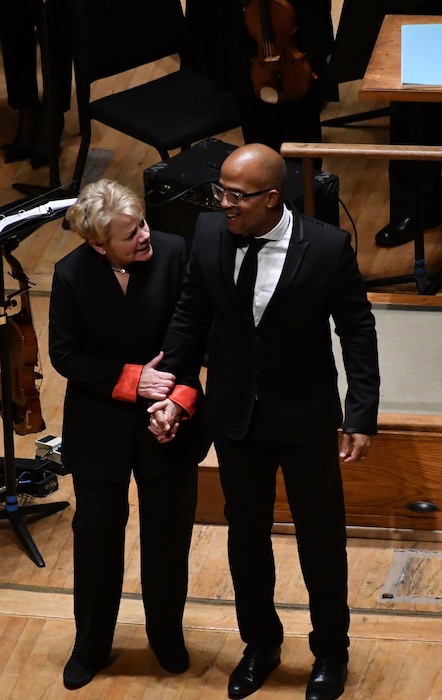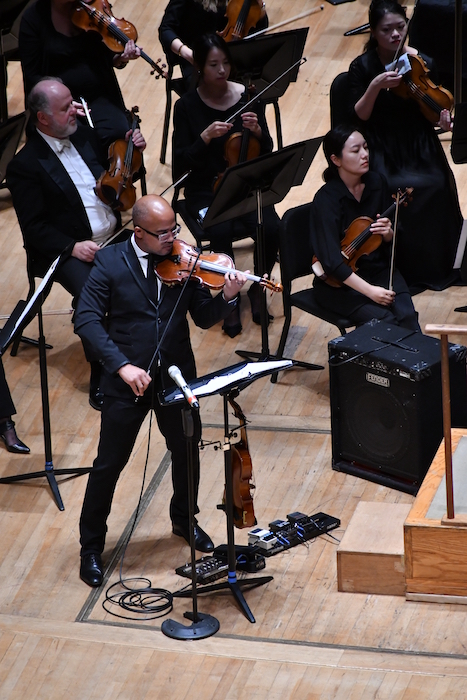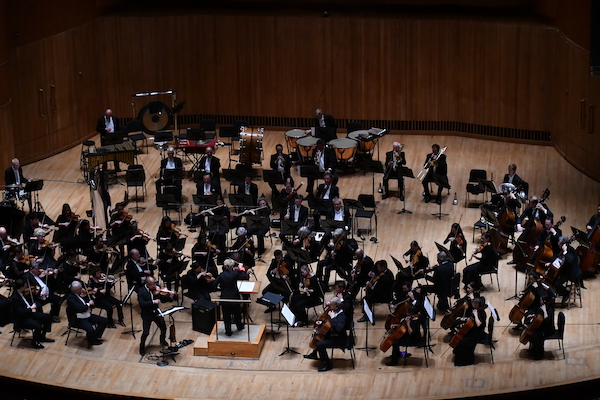Baltimore Symphony’s rousing season opener triumphs in fate-laden program

The cloud over the Baltimore Symphony Orchestra has lifted.
After a bitter labor standoff and a lockout that dragged on for fourteen weeks, musicians and management agreed on a came to a year-long agreement one-year contract earlier this week. To vociferous applause and cheering, music director Marin Alsop and the BSO musicians took the stage as one Friday night at a crowded, celebratory Meyerhoff Symphony Hall, for the opening concert of the season that almost wasn’t.
Serendipitously, Alsop’s scheduled program centered on music inspired by the idea of curses and implacable fate. Still, the music ultimately offered a happy ending to the evening, with Tchaikovsky’s Fourth Symphony, which moves from F minor to sunny F major.
A rousing rendition of the Star-Spangled Banner opened the evening, with Alsop even turning to the audience to cue the baseball-style shouted “Oh!” mid-song. Alsop then took up the microphone, proclaiming in an emotion-filled voice that “Baltimore deserves this great orchestra.” She also announced an addition to the program, Christopher Rouse’s Processional, offered in honor of the late American composer, who was born and died in Charm City.
This added piece, commissioned and premiered by the BSO during its centennial year in 2016, fit deftly into the program’s theme. Rouse described Processional as a funeral march for Edgar Allan Poe, the writer of horror tales who died in Baltimore. In the form of a passacaglia, its ponderous bass line, derived from the letters of Poe’s name, emerged ominously in the low strings and contrabassoon.
Rouse, a master of orchestration, builds the texture, adding the violas, then the violins, a crescendo culminating with powerful brass looming from the depths. The intersecting lines piled on the texture clashed in delicious dissonances, giving the sense of a monstrous form lumbering lugubriously from the shadows. After a full orchestral climax, the piece quickly subsided, evaporating into the mist of three soft gong whooshes.
Singers have long held superstitious beliefs about Verdi’s La forza del destino similar to the fears of actors at the mere mention of Shakespeare’s “Scottish play.” Its story, about doomed lovers cursed by fate, ends up with just about every character dead from murder or suicide. In the BSO’s performance of the Overture, flute, oboe, and clarinet together gave a melancholy lilt to the famous A minor melody, after a blazing opening brass call. Velvety strings cushioned the piece’s second theme, but the tuba, taking the low part Verdi wrote for the cimbasso, tended to overpower the brass in choral sections.
Violinist Daniel Bernard Roumain made a somewhat tentative BSO debut with his Voodoo Violin Concerto, a 2002 work inspired by his Haitian roots. Roumain, playing with his instrument plugged into an amplification system, further modified the tone with rock-inspired sound filters, controlled by pedals. The melodic language abounded in blue notes and bends, with fast sections driven by running patterns of notes in the solo part. These proved technically taxing for Roumain to keep even, but Alsop righted the orchestra’s pacing as he strayed from the pulse.

Switching to whiskey-voiced viola in the slower middle section, Roumain’s intonation lapsed a bit at the top of the range. Much of the piece is a set of improvised cadenzas, at one point weaving in references to the Star-Spangled Banner, complete with a showman’s backward bend on a high note. For long stretches, the orchestra seemed an afterthought, accompaniment provided by a bass line, piano, and drum kit, with the orchestra sitting by in silence. In the concluding section, Roumain sang an affecting, wordless melody into the microphone, a tune he has used again in a later work dedicated to his father, who died in 2014.
The concerto overall felt like a solipsistic solo violin piece with occasional backup from large orchestra. Its appeal, mostly melodic, is simple and in a popular vein, music that inserted a welcome vibe, quite different from the rest of the program. In recent seasons Alsop’s programming has strayed from her strength in American contemporary music, something that this work remedied with flavorful appeal.
Fate was front and center in Tchaikovsky’s Fourth Symphony, interpreted with often restless anxiety by Alsop. The brass were almost always on target in the blaring motif associated with Fate, and kept in careful balance with the purring strings and bubbling woodwinds. Guest principal oboist Max Blair mourned plaintively on the opening theme of the second movement, and the string section offered a fleet, often vanishingly soft performance of the pizzicato part of the Scherzo.
A favorite moment in this symphony is Tchaikovsky’s use of a folk tune, “In the Field Stood a Birch Tree,” as the secondary theme of the finale. This gloomy, mysterious minor-mode melody is about a birch tree whose wood is made into three pipes or flutes and a balalaika, Tchaikovsky’s reference perhaps to his reverence for music. Alsop couched its first appearance in a delicate envelope of sound, proceeding unfortunately to rush through its subsequent statements too hectically.
Many familiar faces were missing in the orchestra, as first chair positions at oboe, clarinet, bassoon, viola, horn, trumpet, and tuba were taken by guest principals, assistant principals, or acting assistant principals. These substitutions—some related to the work stoppage during the lockout—affected intonation and accuracy in the woodwinds in the third and fourth movements. The latter, taken by Alsop with ruthless speed, was thrilling nonetheless. This exciting performance served notice of what Baltimore possesses with this fine orchestra and, hopefully, will motivate management and musicians to come to terms on a longer agreement before the year is up.
Note: This week BSO board chair Barbara Bozzuto was succeeded by Barry Rosen, days after the musician contract resolution. The BSO press office has stated that Bozzuto, who was given the title of chair laureate, made the decision to step down six months ago.
The program will be repeated 8 p.m. Saturday in the Music Center at Strathmore and 3 p.m. Sunday at Meyerhoff Symphony Hall. bsomusic.org

